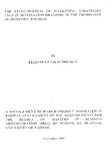| dc.description.abstract | This study was conducted with an objective of finding out the effectiveness of marketing strategies used in destination branding in the promotion of domestic tourism. The main objective was to find out if destination branding is often used in promoting domestic tourism and if so, the effectiveness of the marketing strategies employed. To achieve the above objective, primary data was collected from a sample of 50 tour operators, out of whom 45 responded successfully leading to a response rate of 90%. This was considered sufficient enough to achieve the intended objective.
The tour operators were selected using stratified systematic sampling. The collected data was analyzed using descriptive statistics. These included tables, pie charts, percentages and frequency tables.
The study found that advertising, direct marketing, website and on-line marketing are highly effective marketing strategies used in the promotion of domestic tourism. The joint initiative between the media and the tourism industry was considered highly effective in improving information flow between the industry and the consumers, in this case being the domestic tourists.
However despite this, domestic tourism is still considered expensive by the Kenyan consumers'therefore affecting demand for domestic tourism packages. The government tourism agencies and the media were found to be important instruments in improving domestic tourism as a leading revenue earner for the country. Similarly, the study found that tour operators should be encouraged to use less traditional marketing strategies like the three aspects of destination branding to entice the domestic tourists to discover their beautiful country, thus increasing the number of domestic tourists and increasing revenue earned for the government.
The conclusion from the study therefore is the tour operators do not use all the three aspects of destination branding, that is destination image, personality and attributes. It was found that in the promotion of domestic tourism, tour operators tend to use destination brand image and destination brand attributes more often than destination brand personality. By employing the three aspects of destination branding, tour operators would be able to market the different regions of Kenya to domestic tourists and prove the effectiveness of destination branding. | en_US |

